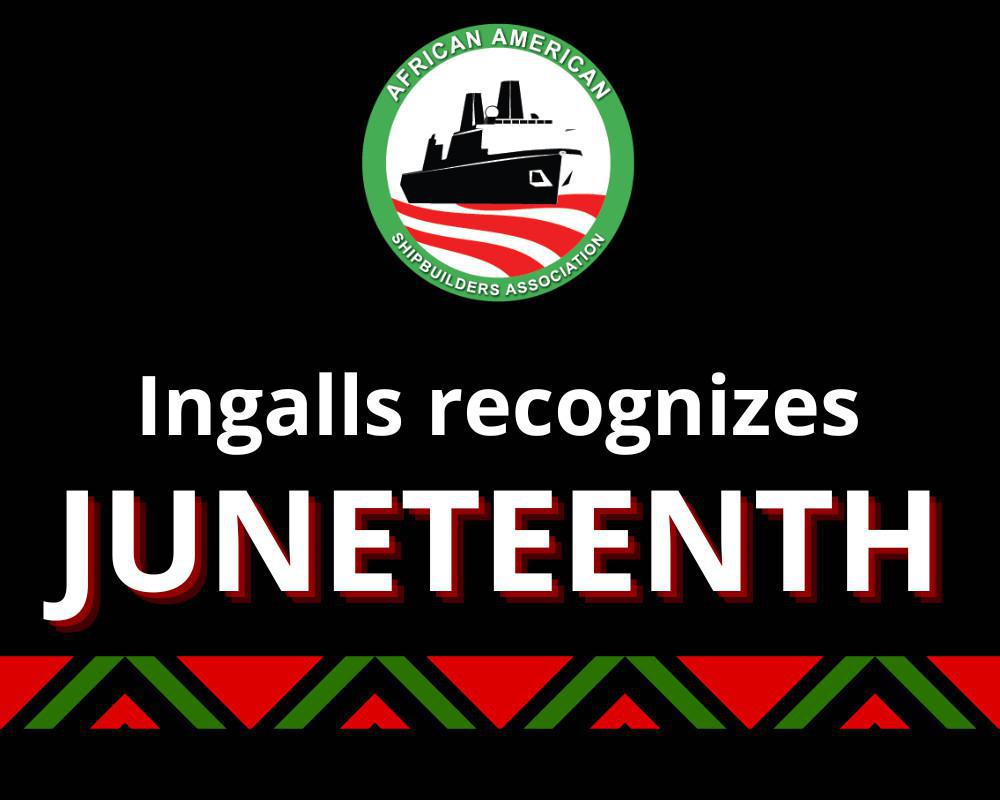AASA (African American Shipbuilders Association) is one of nine established Employee Resource Groups (ERGs) at Ingalls. We are committed to supporting HII’s values as well as its diversity and inclusion program. ERGs are a key part of Ingalls Shipbuilding’s diversity and inclusion strategy and framework. One of the pillars of diversity and inclusion is understanding. The more we learn about each other, the more we gain understanding about each other’s perspectives.
AASA would like to provide information that highlights the significance of Juneteenth. Juneteenth is often identified by several pseudonyms such as Jubilee Day, Emancipation Day or Freedom Day. All of the titles depict a reference to freedom, celebration or a specific date. To fully understand their context, we must revisit American history.
In the late 1800’s there was a division in the United States of America. The primary contributors to this division were irresolution on the issue of slavery and the balance of power in regards to the federal government. This resulted in states seceding and the United States being divided in support of different agendas. The North, identified as the Union States, consisted of manufacturing and industries that didn’t see the validity of slave labor. The South, identified as the Confederate States, consisted of rural plantations and farming that needed the free labor for their economy to flourish. This barrage of events escalated into civil unrest when confederate states attacked a U.S. military installation at Fort Sumter, South Carolina. This triggered President Abraham Lincoln to deploy 75,000 troops into action, marking the commencement of the Civil War of 1861.
The turmoil would commence through various regions over a four year period. In the interim of the Civil War in 1863, there was an issuance of the Emancipation Proclamation. The federal proclamation freed over 3 million enslaved people in the states rebelling from the Union. This initiative also deprived the Confederacy of the bulk of its labor forces maiming its economy. Many of the freed slaves joined the Union Army and fought in the Civil War to push their agenda.
The implementation of this proclamation was not instantaneous. There was much resistance and little communication throughout the confederate regions. This resulted in the freedmen not being aware of their freedom and they were subjected to these conditions for another two years. The conditions were not totally abolished until Union Soldiers arrived in Galveston, Texas on June 19, 1865. The following year, on June 19th, the first official “Juneteenth” celebrations took place in Texas. The phrase is a blending of the word June and nineteenth. The celebrations consisted of prayer, feastings, songs and dancing. Within a few years, other states were celebrating the day as well, making it an annual tradition. Texas was the first state to recognize the occasion as a holiday in 1980.
The recognition and acceptance of the date has evolved into a federal holiday that was established on June 17, 2021. The federal recognition will always be the third Saturday of June. Although the United States celebrated its official independence on July 4th of 1776, true life, liberty, and the pursuit of happiness must be accessible and inclusive to all. AASA hopes this overview highlights the significance of this event to not only African American culture but to the ever-evolving American culture.
Sources:

